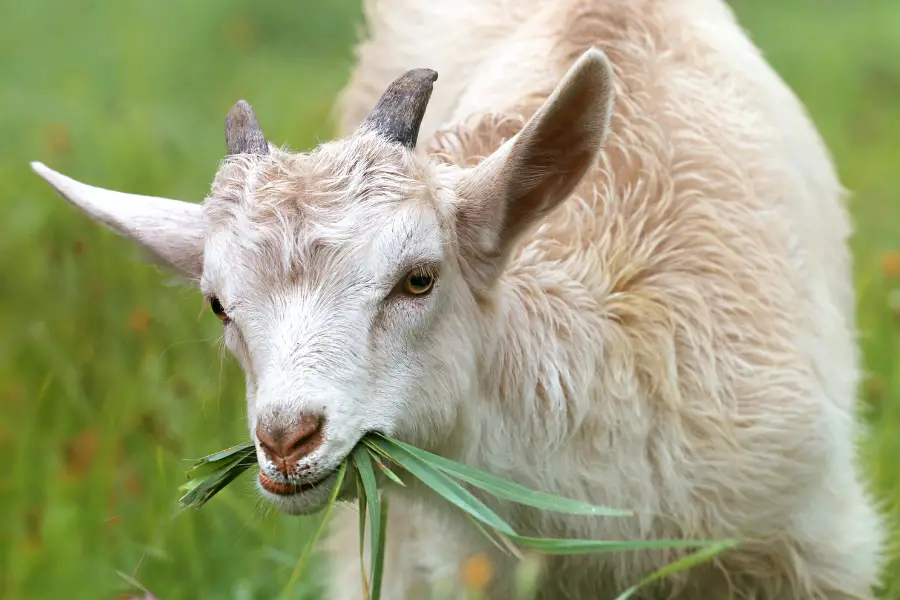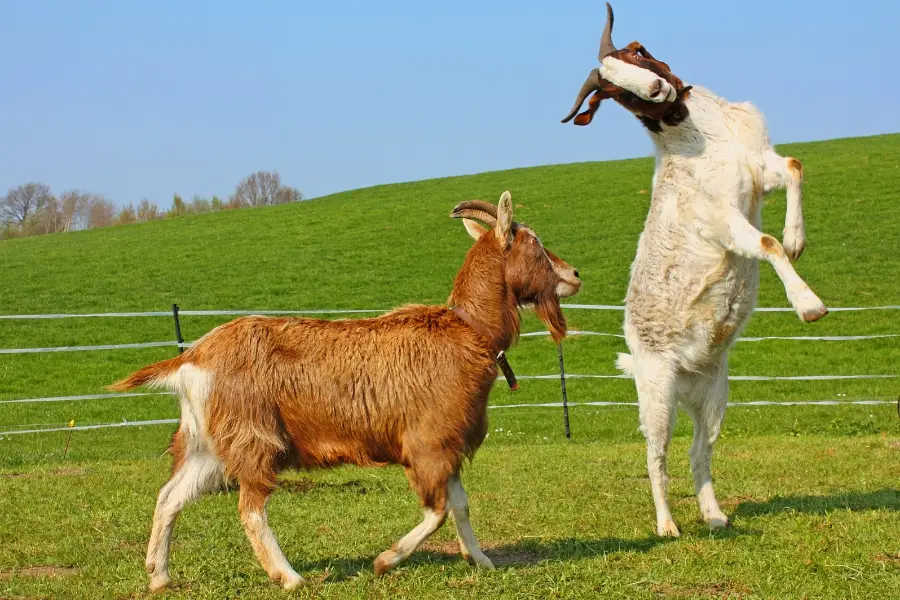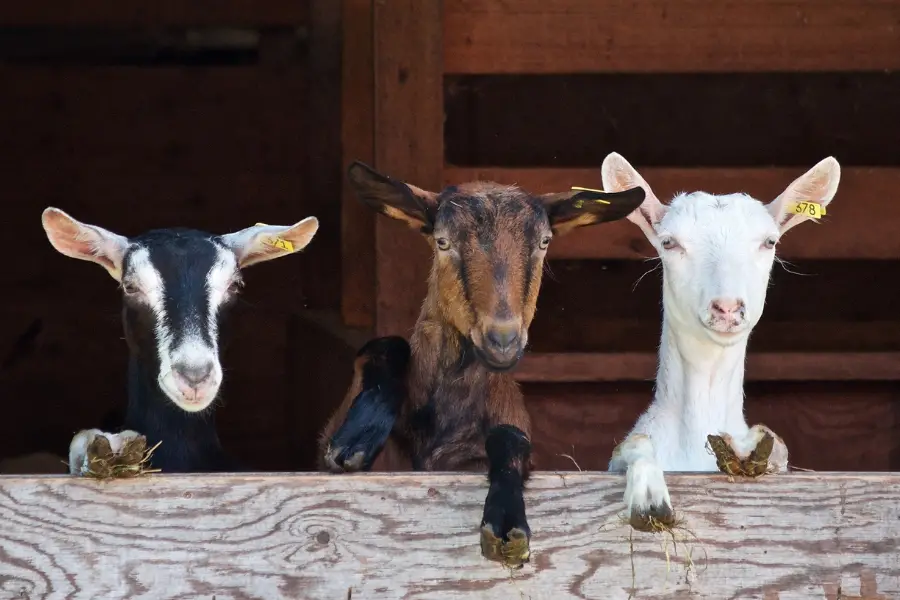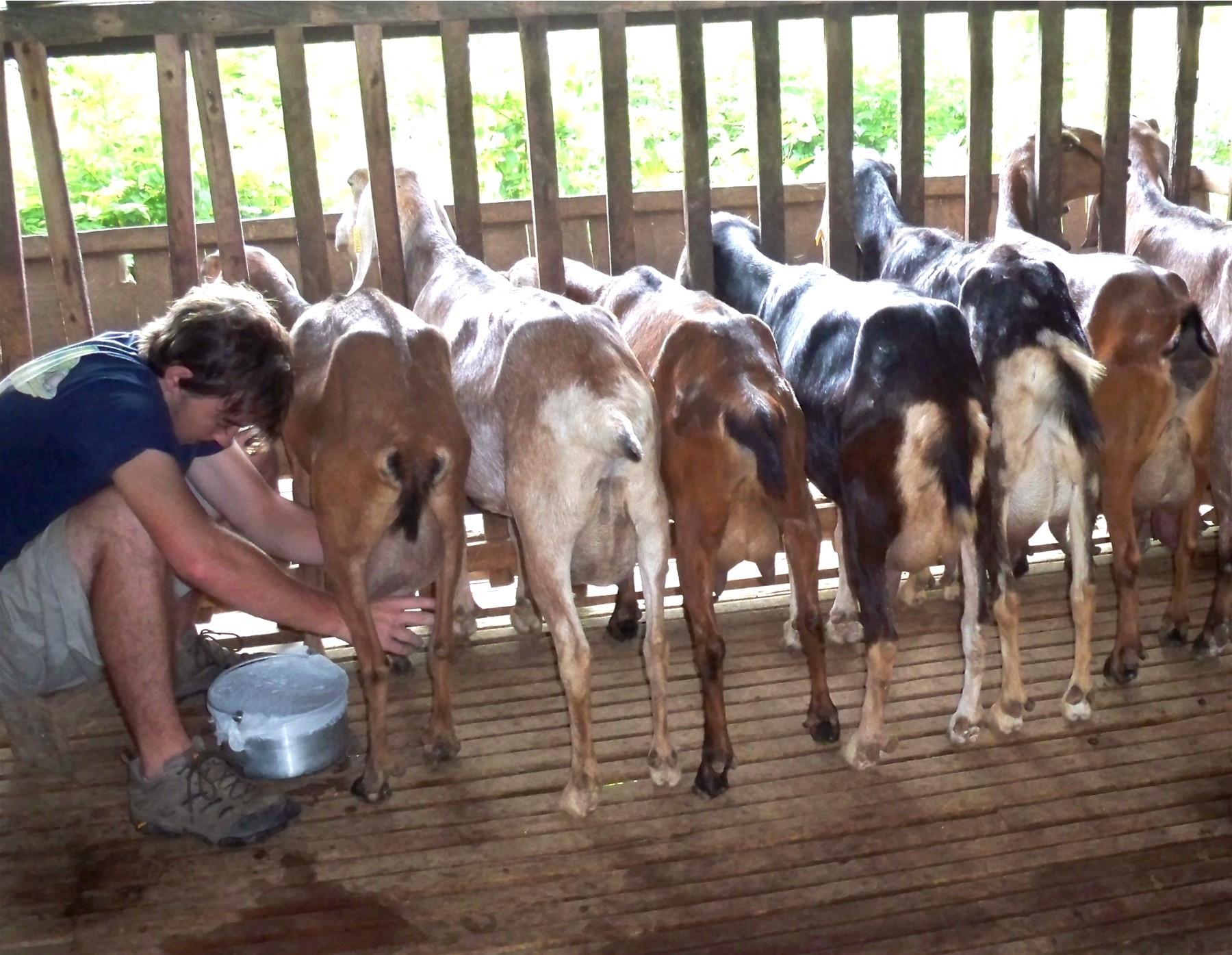
If you’re looking into raising goats for any reason (meat, dairy, pets, or fiber) and have asked yourself “Why raise goats?”, we’ve got you covered!
Because in this comprehensive guide we answer why people raise goats, along with the benefits (and drawbacks) of raising goats…
We also briefly cover the costs associated with goat rearing and how to get started raising goats.
Table of contents
Why Do People Raise Goats?
A goat is known as a “poor man’s cow”, because it is relatively easy to rear, with a low cost of production, adaptability to different climatic conditions, compatibility with other livestock species, and many end-uses.
People raise goats for many reasons and various purposes, including the following:
Raising Goats for Meat
If you live in the USA, you might not know that goat meat is the most popular meat in the world. It’s a favorite delicacy in dozens of countries because goat meat is soft, juicy and rich in protein.
In many developing countries, goat meat is saved for special occasions, making it a sought-after delicacy.

In Western countries, raising goats for meat is a lucrative venture that can earn you consistent profits, since goat meat is growing strongly in demand.
Raising Goats for Milk
Goats are cheaper to buy and easier to maintain than cows, some households will prefer a goat to a cow for milk production. Goat milk has higher nutritional content than a cow’s milk and fetches a better price in the market. Additionally, people who are milk intolerant or lactose intolerant often turn to goat’s milk. Processed goat milk by-products like cheese and yogurt are also on high demand, making goat rearing a viable business in many parts of the world.
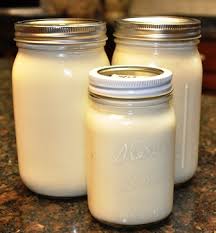
Raising Goats for Pet
Are you surprised? Goats are very social animals raised as pets. While most people want to raise goats for meat and milk, there is an emerging class that will raise goats for fun and companionship. Nigerian dwarf and the pygmy are the most preferred type of mini goats kept as pets. Always consult your local town administration for the rules and regulations for recommendations.
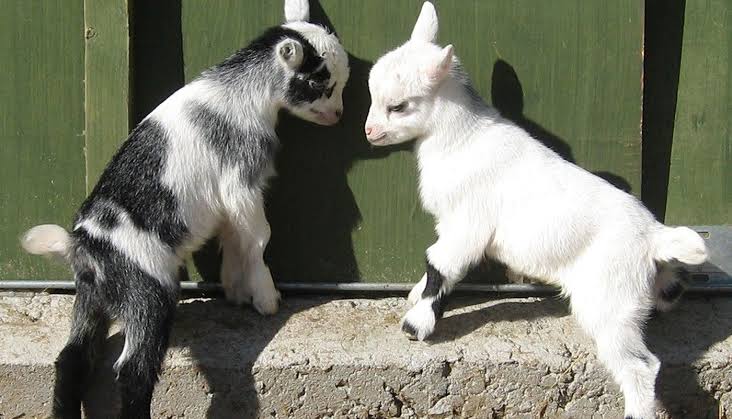
Raising Goats for Fiber
Do you know that goats produce the most expensive fibers in the world? People think that sheep are an essential animal in the production of fiber. Mohair and cashmere are the leading and most expensive fiber brands in the world. These by-products will always fetch a farmer some good return on investment. Angoras goats produce mohair, which blends different types of fibers in the market.

Raising Goats for Cashmere
Some farmers will raise goats with the sole purpose of producing cashmere fiber. Cashmere is an expensive and exotic fiber derived from the undercoat of cashmere goats. Cashmere goats are raised for their top tier fiber and meat.
Cashmere production is a labor-intensive activity, unlike wool production in sheep. Cashmere fiber grows during the winter and is shorn in the spring.

When an Angora’s goat mates with a non-fiber producing goat, they will produce a cashmere undercoat offspring cross-breed like the Pygora, which is a cross of Angora and Pygmy. Unlike other goat’s production methods, raising goats for cashmere is more labor-intensive and must be undertaken with ultimate care for the production of quality cashmere.
Raising Show Goats
Goats are very social and accommodative, and it is for this reason that they are in the showbiz business. Show goats display their aesthetic value before a panel of judges with the winning goat taking the trophy home. Raising goats for the show is increasing each year gradually since goats are easier to work with and require less space, feeds, and attention.

Raising Brush Goats
Individuals and organizations are always seeking for goats to clear brush and weeds from their fields for at a price. Large scale goat’s farmers make money by leasing their goats. Raising brush goats is a cheap and effective way of weed control in large fields and farms.
Raising goats for brush control is a duo business idea since in the run you will benefit in the following ways:

- Goats will get enough feed in the fields where they graze hence lowering the production cost.
- Goat’s owners are paid when goats clear brush from the field.
- When the goats are mature, they are sold for meat.
Advantages of Raising Goats
There are many advantages of raising goats – but also some important disadvantages that you need to consider before jumping into goat rearing.
Let’s start with the advantages of raising goats first:
- Goats enhance self-sufficiency and sustainability in developing nations.
- Goats are hardy and versatile. They can be raised in any part of the world, for they are well adapted.
- Goats are multi-purpose animals that will produce milk, meat, fiber, hides, and mature.
- Goats are easy to raise, for they require less space and can share a shelter with other domestic animals like cows.
- Goats are resistant to many diseases; hence they are raised on a minimal budget.
- Goat meat is accepted in all cultures and religious denominations in the world hence ready market.
- Goat milk is more nutritious than cow milk and fetches better prices in the market.
- They are easy and friendly to handle, and Children can take them to the grazing fields.
- They have an excellent digestive system and feeds on any type of roughage and still produce enough milk.
- Cashmere, Mohair, and Pashmina products derived from goats; hence they generate sufficient income for goat owners.
- Goat milk is suitable for people with milk allergies.
- Goat’s urine and manure are rich in essential nutrients that are used in the propagation of crops.
- In hilly and mountainous regions, goats are used to haul small loads and carts.
- Goats can provide security in your household since they will bleat anytime they spot anything strange.
- Goats are docile and playful and can be raised as pets.
- Breeding kids for sale is a lucrative income generator since goats are very prolific and mature very fast.
- Goats will keep your fields free from weeds and shrubs and also trim your lawns at no cost.
Disadvantages of Raising Goats
- Lack of knowledge: Most goat farmers will rear goats without any target goal or reason for raising goats. They will raise goats because their neighbors raise goats.
- Raising the wrong breed: Most goat farmers will raise goats without any target market; hence their business model will fail them.
- Goats have no boundaries; they will snoop on everything that comes their way. As a goat farmer, always mend your fences to avoid confrontations with your neighbors.
- Goats are very noisy and loud.
- Goats eat almost all kinds of plants, some of which are toxic. Consuming milk from these goats has dire health consequences.
- They are very curious; they will mess up your car paintwork as well as your garden.
- Goats attract a lot of parasites, some of which will affect your household.
- Goats are small; hence they are prone to predators and thieves.
- When a large number of goats invade a farm, it can lead to a total crop loss.
- Goats are prone to cross-breeding when different breeds are raised together, which can lead to a total loss in value, considering the target market.
- Farmers face a dilemma when transporting goats due to the lack of custom-designed vehicles.
- Many goat farmers in developing nations are within out of reach of agricultural extension officers and veterinary services.
Cost of Raising Goats
The cost of goat rearing is determined by several factors like:
- The number of goats to be raised
- Prevalent market conditions
- Cost of feeds
- Locality and location
- The target market
The following practices and tips are essential to a goat farmer and will determine the overall cost of production in the long run.
Purchasing Goats
Starting a large scale farm will require many goats, which will cost a fortune to start with. A mature goat will fetch between $ 100 to $ 300 depending on the breed and location.
Housing
If you are venturing into goat farming in a metropolitan area, it will cost you more than a farmer starting it in the rural areas. The housing cost is determined by the number of goats one is to raise, location, and the materials to be used in the construction. Raising goats in a ranch is much cheaper since they require no housing costs.
Fencing
Freehold goat keeping in the rural areas will require subdivision and fencing of the grazing fields. A good fence is crucial for goats tend to view the other side as the greener side. The cost of fencing is determined by the area to be fenced and the fencing material to be used.
Labour
Goats’ rearing is a labor-intensive activity more so when raising goats for milk since they will require to be milked two times a day. The cost of labor is determined the how much you pay your employees per hour. Large goat herds require more handler; hence more cost is incurred.
Cost of Feed
Goats will not only feed on pastures but will require to be feed on supplements to boost their immune system and to increase production. Pumpkins seeds, alfalfa pellets, and mineral blocks are essential supplements.
Veterinary services
Just like other farm animals, goats require the attention of a veterinary doctor one time or another. They need to be dewormed and tested for diseases all year round.
Milking equipment
Raising goats for milk will require milking equipment’s like milking pails, strip cups, mastitis spray, teat wipes, and funnels.
Raising Goats in a City
Did you know that you can raise goats in your backyard? Yes, you do not have to move into rural areas for you to raise goats; you can keep them right in your backyard. Before you start construction of sheds, there are a few factors to consider:
- City by-laws
Does your local authority allow the rearing of animals in the backyard? Some cities have strict laws on animal rearing. Consult your local authority and seek clarification.
- Space
You should have enough space for the construction of sheds raising two goats that will require more than 400 square feet of space.
Raising goats in the city has its advantages and disadvantage for the owner and the immediate neighbors.
First, let look at the advantages of raising goats in a city:
- A fresh supply of milk
Goat milk is very rich in nutrients and has no allergy reaction; hence it is fit for people allergic to milk.
- Hedge and lawn trimmer
Do you have an overgrown lawn and brush? A goat will clear the brush and trim your lawn at no cost. Forget the cost of purchasing a lawnmower and the operating expenses.
- Develop a good connection with nature
During winter and heavy storms, you will be forced to go out and attend to your goats. You have to leave the comfort and warmth of your house and face the storm as you follow your daily feeding program.
- Exercise
Goat rearing in the city is not for the faint-hearted or a walk in the park. You have to sweat! You have to wrestle your goat to the ground during wolves trimming, hauling of goat feeds from your car to the store. Many times you will be running after your goats when they decide to get naughty.
- Source of manure
Goats dropping can be used manure in your garden and flowers without composition. It is rich in all the essential nutrients required by crops.
Disadvantages of raising goats in a city:
- Bad odors
The stench of buck’s urine is overwhelming, and there is nothing you can do to cover it up. If you are raising your goats in a closed community, be ready to handle complaints from your neighbor each day.
- Gross mating behaviors
Bucks have gross mating habits that some neighbors will find weird. If you have to keep bucks around, of which you will because you need kids to raise, raise your fences, and keep the back garden obscured.
- Lack of proper feeds
Raising goats in the city can be quite challenging when it comes to finding the right feeds. Goat pellets cannot sustain your goats since they also need some vegetative leaves, which are quite hardy to find in a big city. One has to source for feeds from the outskirts of the city, which can be expensive.
- Manure handling
This task can be a big challenge when a farmer has no place to dispose of the manure and the odor that emanates from manure. Manure attracts flies and larvae; however, this can be handled with the introduction of chicken in the backyard garden. Chickens will eat the larvae as well as toss around the manure for quick decomposition.
- Noise levels
Goats make a lot of noise, especially when they are on heat. Constant bleating will irritate you as well as your neighbors, and there is nothing you can do about it.
- Noise levels
Goats make a lot of noise, especially when they are on heat. Constant bleating will irritate you as well as your neighbors, and there is nothing you can do about it.
Raising Sheep vs. Goats: Which is better?
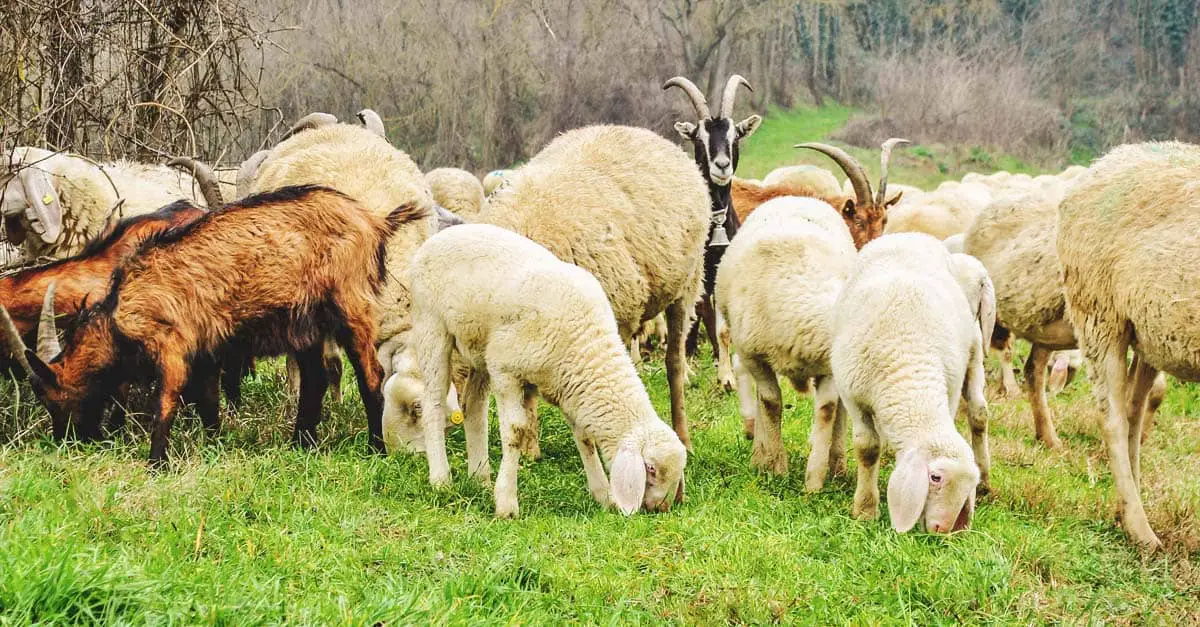
Many first time farmers are always torn in between sheep and goat farming. They want to know which of the two animals will do better and the costs involved in each animal. Below is a breakdown of what you need to know about each animal.
Fencing
Goats are hard to keep in an enclosure. They will always find that weak section of your fence and escape, unlike sheep, which are more docile and respect boundaries. A good fence should be in place not only to keep the animals in check but also to prevent predators.
Handling
Goats are easier to handle during routine procedures like dehorning and deworming, unlike sheep, which are easier frighten by such procedures and will always be on the run.
Shearing
Sheep require to be shorn two times per year; this is a labor-intensive activity, especially if you have many sheep on your farm. Unless you are raising Angoras goats for wool, no shearing is carried out on goats. To avoid shearing your sheep, you can rear breeds like dopers and Barbados blackberries.
Browsing and Grazing
Goats are generally browsers and will eat leaves, brush, and twigs while sheep are grazers and will eat grass. If you want your field to be free of weeds and brush opt for goats, while if you have plenty of grass in the fields and lawn, go for sheep.
Noise-Making
Goats and sheep make a lot of noise, they can be calm for one moment, but the next moment hell breaks loose. All in all, goats are the loudest amongst the two.
Can You Raise Goats and Chickens Together?
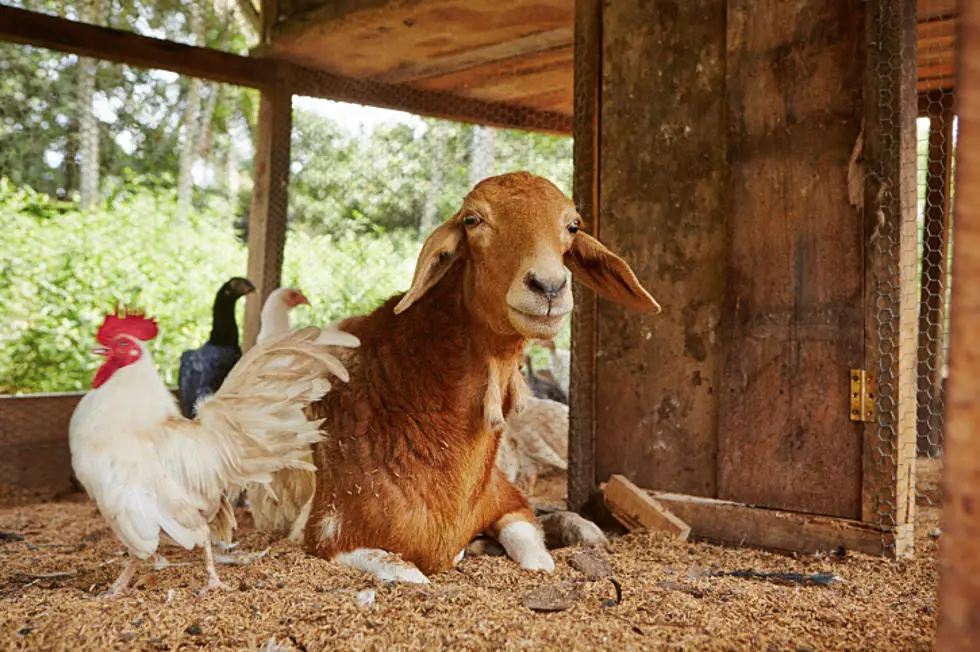
A farmer can rear both chicken and goats together for a mutual benefit. Chicken requires less space to rear, unlike goats. The following are benefits of raising chicken and goats together:
Feed Management
Each animal should have a separate feeding trough. Chickens will eat all the feeds a goat drops as it feeds. This will save you a substantial amount on feeds, but it can get fatal if a goat consumes chicken feeds in large quantities. Always keep the chicken feeds in their coop and feeds the goats before you let the chickens out. Goats cannot eat soiled feeds with chicken droppings.
Pest Management
Chickens will eat parasites and pest on a goats hide like ticks hence controlling diseases and limiting expenses to purchase drugs. Chickens will also eat all the larvae in the goat’s droppings.
Housing
Provide separate housing structures for chicken and goats. Chickens need to be in their coop at night to keep predators at bay. Separate housing will also ensure minimal feed wastage since both animals will not tamper with their feeds.
The downside of raising goats and chickens together is minimal, but I will highlight the main critical factor.
Disease Control
Coccidiosis is the most prevalent disease between goats and chicken; the good thing is that it cannot be transmitted from the goats to the chicken and vice-versa.
Cryptosporidiosis is another common disease that is prevalent in both goats and chickens. An infected chicken will transmit the disease to the goats and vice-versa.
Salmonella bacteria thrive in the chicken’s small intestines and can be transmitted to goats when they come into contact with chicken droppings. If a nursing doe udder comes into contact with the chicken droppings and a kid nurses from the said contaminated udder, the kid will suffer a severe infection, which can be fatal.
To keep common infections and diseases at bay, observe stringent hygiene routine on both animals. If your animals are displaying any symptoms, quarantine them and call in your veterinary doctor before it is too late.
What Are the Easiest Goats to Raise?
There are several factors to put in place when considering the easiest breeds of goats to raise. These include but are not limited to:
- The target market: Why are you raising goats and for what purpose.
- Capital: will determine the number of goats to keep.
- Location: where you will raise your goats in the city or a rural farm
- Availability of labor
These are some of the easiest breeds of goats to raise, whether in rural farms or the city.
- Goats for milk production
If you are much into milk production, Saanen goat is the right breed for you. This breed will produce 1 gallon to 3 gallons of milk per day. With the high demand for goat milk and the reasonable market prices, you will be smiling to the bank.
- Best goats for meat
Boar goats are ready for slaughter within one year since they mature very fast, unlike other breeds. A mature buck will weigh more than 400 pounds, fetching you some cold cash.
- Best goat for backyard
Swiss Alpine goats are best suited for the urban setup. They are small in size, easy to handle and produce sweet milk for the farmer. Dehorning should be done right after birth.
- Goats for butter
Anglo Nubian breed is best suited for butter production. These goats produce milk with high butter content and will always present themselves for milking during milking hours.
- Goats for wool
Angoras and Pashmina are the best breeds to raise to silk and wool. Pashmina is challenging to capture since they live in high altitude areas in Asia.
- Best aesthetic goat
If you want to keep, a rare and aesthetic goat,opt for the Arapawa breed. This breed is hard to find and very expensive to buy. There are fewer than 500 registered owners in the world.
Sources:
Goat Production Handbook 2015, Mdukatshani, Heifer International-South Africa and KwaZulu-Natal Department of Agriculture and Rural Development
A Handbook for Farmers, 2066, Food and Agriculture Organization of the United Nations, Emergency Rehabilitation and Coordination Unit
Goat Song: A Seasonal Life, A Short History of Herding, and the Art of Making Cheese by Brad Kessler
Mitchell, E. R., 1996. Brush control with goats, The Kerr Centre for Sustainable Agriculture
https://www.mla.com.au/globalassets/mla-corporate/generic/extension-training
http://cemariposa.ucanr.edu/files/103253.pdf
http://www.kerrcenter.com/publications/brushcontrol_goats.html
https://www.hobbyfarms.com/ask-martok-keeping-sheep-versus-goats-4/


